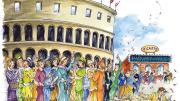1921
Thirteen female students from the Graduate School of Education apply for tickets to the Yale Game. The Bulletin reports that three ticket clerks “whose temperaments are especially nervous have followed the advice of their physicians by resigning.”
1931
The Corporation decides that Harvard will not participate in a fundraising postseason football game for unemployment relief, to avoid setting a potentially troublesome precedent and further commercializing college football by playing only to raise money. Collections at the Dartmouth, Holy Cross, and Yale games, however, raise more than $20,000 for the same purpose.
1941
Two freshmen enliven hour-exam period with their Crimson classified: “Wanted—Information where one may obtain a human corpse in reasonable condition.” The 42 phone calls in response range from students wishing to be embalmed after hourlies to several funeral directors, the police department, and the morgue. The Yardlings plead simple curiosity as the impetus for the ad.
1961
Among alterations proposed for the Harvard School of Business Administration after a two-year study initiated by its dean is a change of name. The Bulletin reports a “widespread feeling” that the present name “does not imply an institution of professional stature, and that there should be…a Harvard Business School.”
1981
The Harvard-Radcliffe Conservative Club publishes the first issue of The Harvard Salient. Its editors all “commend free enterprise, limited government, a redoubtable national defense, the integrity of community, and the sustaining prescriptions of tradition,” and promise not to practice the incendiary journalism of the year-old Dartmouth Review.
2001
A new plaque installed in Memorial Church honors three Radcliffe alumnae—Lucy Nettie Fletcher ’10, Ruth Holden ’11, and special student Helen Homans —who died in World War I while serving as nurses.









